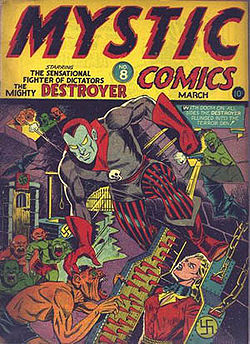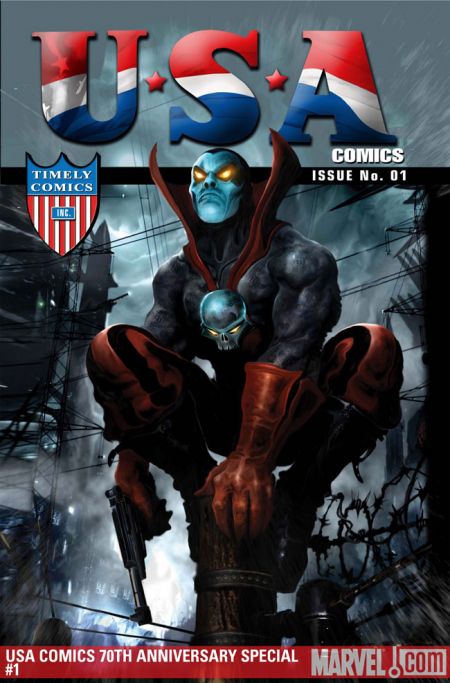Comics /
Comic Reviews /
Marvel Comics
USA Comics 70th Anniversary Special #1
By Andy Frisk
July 7, 2009 - 08:00
The Destroyer, created by Stan Lee, is a Golden Age hero who was a sort of foil to Captain
America, although he shared the same goal, the total defeat of the Nazis during World War II. Where Captain
America was a brightly colored symbol of the American spirit during the war, The Destroyer was a more clandestine and dark hued guerilla fighter behind enemy lines.
Briefly, Kevin “Keen” Marlowe was an American journalist who was imprisoned by the Nazis in
Germany while he was reporting for an American newspaper. The Nazis thought he was an American spy. He was shipped off to a concentration camp where he met a fellow prisoner, named Prof. Eric Schmitt, who was working on a version of the same super-soldier serum that gave Steve Rogers his powers. Unwilling to turn over his formula to the Nazis, he instead administers it to Marlowe, who then breaks out of the camp, adopts a menacing outfit, and takes his war to the Nazis on their home turf. Thus, The Destroyer is born.
Very little, if any, of this history is recapped in
USA Comics 70th Anniversary Special #1, and its not really needed to enjoy the story, but proved to enhance the experience once I looked it up online. Like the rest of Marvel’s 70th Anniversary Specials, USA Comics contains an original story and a Golden Age reprint. The original story, by John Arcudi, is quite good, and easily measures up to the original tales in The Human Torch and Young Allies Comics’ 70th Anniversary Specials, as one of the best original tales thus far of all the specials.
We have to assume that this Destroyer is the original. His back story and continuity get a little confusing over the years, as most hero’s histories do, but at one point there was a Destroyer, or two, who weren’t even Marlowe. As this Destroyer’s tale opens, a German reporter named Emil Hansen, who we learn is not a Nazi, is interviewing one of Gobbel’s "ministry of public enlightenment” Colonels on the decision to invade
Russia. They are aboard a train crossing the German countryside when The Destroyer attacks. He makes quick work of the Colonel’s men, and kidnaps Hansen, taking the reporter with him as he battles across
Germany, sabotaging railway switches, diverting trains, and killing Nazis. The reader, along with Hansen, has no clue as to what The Destroyer’s mission is, until they reach the end of the line, literally. The Destroyer’s most recently hijacked train arrives at a predetermined destination. It seems that all along, The Destroyer had a specific goal in mind regarding Hansen, the reporter, and a specific subject for him to write about…
The rising tension, swift action, and poignant finale to
USA Comics 70th Anniversary Special #1, make this book a powerful read. As mentioned, it ranks with The Human Torch and Young Allies in its storytelling. Arcudi, while writing a tale that serves to continue to remind its readers, and the world, about the horrors of the Nazis “Final Solution,” also manages to construct a compelling character in his version of The Destroyer. While The Destroyer was originally conceived as a dark hued horror of a scourge, his costume seems a little silly. It looks like a composite of The Vision and Punisher’s outfits, with a little Spawn thrown in, and capped off by “circus pants,” as Hansen calls them. (His look might well have inspired all three of the aforementioned heroes’ looks.) When we see where The Destroyer comes from though, and what he is symbolizing with his outfit, it loses all semblance of silliness.
The bluish, ashen hue of his face mask and skull emblem serves as a reminder, to the Nazis he kills, of the bodies they have burned at the concentration camps. It’s almost as if The Destroyer, through this symbol, is meant to convey the return of the dead as an avenging soldier. His red gloves reflect the blood spilled at the camps, and his “circus pants” serve as a symbol, in memoriam, of all who wore the striped, camp prisoner outfits.
Steve Ellis’ art captures the menacing stature, and fearful look of The Destroyer. Rarely is there a shot of his face where it isn’t contorted into an angry snarl. His movements and stances are powerful and confident. He literally is a super-soldier. Where Captain
America is a product of a super-soldier serum, he is a super-hero. The Destroyer is the living embodiment of the super-soldier. He mows down Nazis with an efficiency and accuracy that is super human, obviously, but therein is the point. He kills. He must, he is truly at war, and in the trenches. The Destroyer’s outfit may have been a bit of an inspiration for The Punisher’s, we really don’t know this for sure, and it’s a logical assumption, but he leaves The Punisher leagues behind him with his proficiency. Ellis captures it all with his artwork quite well.
Langley’s cover art though, is perhaps the most powerful image of The Destroyer throughout the entire work. It captures the darkness of the character, as well as his powerful and determined strength. The scene of him perched upon a post just outside a camp like a deadly bird of prey, preparing to strike will serve, if the character becomes active again regularly, as the image that birthed the look of the modern Destroyer.
The reprinted tale, from All-Winners Comics # 3, published in the winter of 1942, is a good choice for inclusion in this special. It contains many similarities in action with the new tale, which obviously served as an inspiration for Arcudi. In the Golden Age tale, The Destroyer sabotages railway lines, knocks down several Nazis, and “splats” them from the passenger side of a truck, much like he does in the new tale. An interesting aspect of the Golden Age tale is that it mentions concentration camps. Obviously, at the time of its publication, the full extent of the camps’ horrors were not widely known. The Destroyer himself will always be linked to the horrors of the camps’ victims, of which he is an avenger of. This early mention of the camps would forever be a part of the myth of The Destroyer, and have a direct influence on his development.
Overall, USA Comics 70th Anniversary Special # 1 is easily one of the best specials thus far celebrating 70 years of Marvel heroes. While not as lighthearted as Miss
America’s special was or as touching as Captain
America’s was, it definitely is more somber, and important, when one considers its motivating subject matter.
Rating: 9 /10
Last Updated: January 17, 2025 - 08:20

